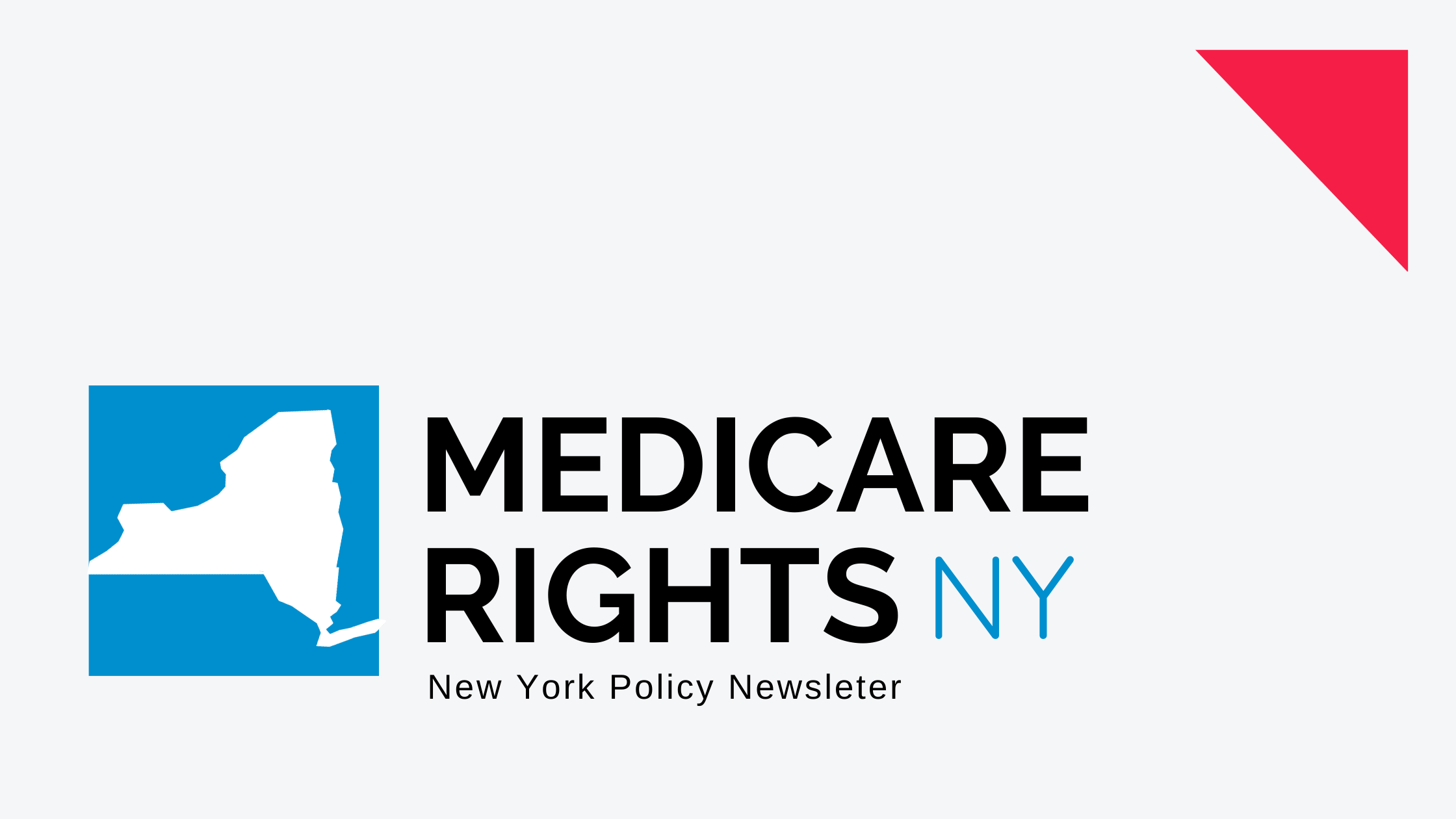Join Us Live for a Discussion on Medicare, Democracy, and the Future of Health Care

Medicare Rights Advocacy
Upcoming Medicare Rights webinar on what New Yorkers need to know about eligibility expansion for Medicaid and Medicare Savings Programs
On June 14 at 3:00 PM Eastern Time, join the Medicare Rights Center and its partners from New York Legal Assistance Group (NYLAG) and Medicaid Matters New York to discuss New York’s critical eligibility expansions for Medicaid and Medicare Savings Programs (MSPs). This online information session will also cover the remaining major concerns about these benefits in the face of the winding down public health emergency (PHE).
The webinar will review estimated eligibility guidelines for Medicaid and MSPs, which take effect January 1, 2023, and other information important for caregivers and professionals who assist people with Medicare and Medicaid. Expert speakers will also review ongoing advocacy efforts related to the public health emergency, and there will be an opportunity to ask questions.
Register today.
For more information about eligibility expansion for Medicaid and MSPs in New York, read Medicare Rights’ flier.
Medicare Rights annual trends report outlines key challenges facing people with Medicare
The Medicare Rights Center has released its annual helpline trends report, Medicare Trends and Recommendations: An Analysis of 2020-2021 Call Data from the Medicare Rights Center’s National Helpline. Drawn from Medicare Rights’ direct experience with beneficiaries and their caregivers, including through its national helpline and online reference tool, the report outlines key challenges facing people with Medicare and recommends ways to improve the program.
In 2020 and 2021, Medicare Rights staff and volunteers addressed nearly 42,000 questions through the helpline while Medicare Interactive (MI) fielded more than 5.5 million questions. Several key trends stood out, including:
- Medicare enrollment and affordability challenges, often exacerbated by COVID-19
- Difficulty appealing Medicare Advantage (MA) and Part D denials
- Problems accessing and affording prescription drugs
- The need for a comprehensive Medicare dental benefit
To learn more about the 2020-2021 helpline trends report, please visit Medicare Rights’ blog.
New York State and Federal Government Updates
2023 Part B premium to incorporate Aduhelm coverage and pricing decisions
The Centers for Medicare & Medicaid (CMS) services has released an analysis of Medicare’s 2022 Part B premium, factoring in mid-year changes that are likely to keep Medicare spending lower than was expected when the premium was first announced. These mid-year changes include the price reduction of the controversial Alzheimer’s drug, Aduhelm, and the decision to limit coverage to people who are enrolled in qualifying clinical trials. The report discourages a full-scale redetermination of 2022 premiums to account for these shifts and recommends instead that any cost-savings be incorporated into the 2023 Part B premium calculation.
While Medicare Rights supported the reassessment of the 2022 Part B premium, it accepts that revising the premium mid-year causes significant administrative problems and faces legal hurdles. At the same time, it remains concerning that a single drug could trigger such a premium jump. This points to the need to do more to rein in drug prices in Part B, as well as in the Part D prescription drug benefit.
For more information about the report, please visit Medicare Rights’ blog.
CMS announces proposed rule implementing important Medicare enrollment changes
CMS recently released a proposed rule to implement important changes in the Consolidated Appropriations Act, 2021 (CAA), which was signed into law on December 27, 2020. That law, which was championed by the Medicare Rights Center, established clearer timelines for Part B enrollment taking effect and also established authority for CMS to create Special Enrollment Periods (SEPs) to account for “exceptional circumstances” that might cause a person to miss or make a mistake around their initial or other enrollment period.
Starting in 2023, Medicare coverage will be effective the month after enrollment for people who enroll in the last three months of their Initial Enrollment Period (IEP) or during the General Enrollment Period (GEP), reducing or eliminating gaps in coverage. The rule also proposes several SEPs for people who meet “exceptional conditions” and missed a Medicare enrollment period including:
- An SEP for individuals impacted by an emergency or disaster
- An SEP for Health Plan or Employer Error that constitutes “material misrepresentation” of information related to enrolling in Medicare
- An SEP for Formerly Incarcerated Individuals
- An SEP to coordinate with the termination of Medicaid eligibility
- An SEP on a case-by-case basis for other exceptional conditions where circumstances beyond the individual’s control prevented them from using another enrollment period
For more information about the proposed rule, please visit Medicare Rights’ blog.
Show Comments
We welcome thoughtful, respectful discussion on our website. To maintain a safe and constructive environment, comments that include profanity or violent, threatening language will be hidden. We may ban commentors who repeatedly cross these guidelines.
Help Us Protect & Strengthen Medicare
Donate today and make a lasting impact
More than 67 million people rely on Medicare—but many still face barriers to the care they need. With your support, we provide free, unbiased help to people navigating Medicare and work across the country with federal and state advocates to protect Medicare’s future and address the needs of those it serves.
The Latest
Most Read
Add Medicare to Your Inbox
Sign up to receive Medicare news, policy developments, and other useful updates from the Medicare Rights.
View this profile on InstagramMedicare Rights Center (@medicarerights) • Instagram photos and videos









